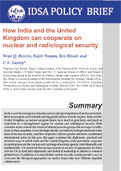How India and the United Kingdom can Cooperate on Nuclear and Radiological Security
 In the era of the resurgence of nuclear power and growing threat of nuclear terrorism, there is an urgent need to build a strong global nuclear security regime. India and the United Kingdom, as nuclear weapons states, have much to gain from, and much to contribute to, a strengthened regime for nuclear and radiological security. Both countries must confront the threat of Islamist terrorist groups that are eager to inflict mass civilian casualties. Given the high priority accorded by both governments to the issue of nuclear security, and their respective calls for greater and more coordinated international action in this area, this paper examines the diplomatic, practical and technical ways in which India and the United Kingdom could potentially cooperate in pushing forward the nuclear and radiological security agenda, both bilaterally and multilaterally. It is observed that nuclear security is an area of opportunity for India and the UK to lend their diplomatic and technical leadership to address a common global threat. In addition, it is also felt that nuclear security would provide a way to overcome the divergent approaches on nuclear issues that have hitherto impeded collaboration.
In the era of the resurgence of nuclear power and growing threat of nuclear terrorism, there is an urgent need to build a strong global nuclear security regime. India and the United Kingdom, as nuclear weapons states, have much to gain from, and much to contribute to, a strengthened regime for nuclear and radiological security. Both countries must confront the threat of Islamist terrorist groups that are eager to inflict mass civilian casualties. Given the high priority accorded by both governments to the issue of nuclear security, and their respective calls for greater and more coordinated international action in this area, this paper examines the diplomatic, practical and technical ways in which India and the United Kingdom could potentially cooperate in pushing forward the nuclear and radiological security agenda, both bilaterally and multilaterally. It is observed that nuclear security is an area of opportunity for India and the UK to lend their diplomatic and technical leadership to address a common global threat. In addition, it is also felt that nuclear security would provide a way to overcome the divergent approaches on nuclear issues that have hitherto impeded collaboration.








